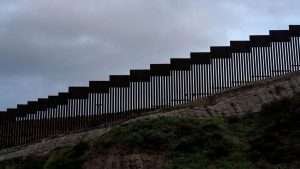The Volokh Conspiracy
Mostly law professors | Sometimes contrarian | Often libertarian | Always independent
Supreme Court Stays Lower Court Ruling Against Trump's Border Wall Construction
It's a win for Trump; but only on procedural grounds. The broader legal battle over the wall is far from over.

Earlier today, the Supreme Court issued a stay against a lower-court injunction blocking President Donald Trump from diverting military funds to build his border wall. At least for the moment, Trump can therefore continue to divert the funds for wall construction until the lower courts (and possibly the Supreme Court) issue a final decision on the case. The decision was a 5-4 split along ideological lines, with the five conservative justices voting to stay the injunction, while the four liberals all dissented. Three of the liberal justices would have denied the stay completely. Justice Stephen Breyer wrote an opinion indicating that he would have upheld the lower court injunction against actually using funds to build the wall, but would have permitted the government to "finalize the contracts" for construction. The latter, Breyer contends, would not cause any "irreparable harm" to the plaintiffs, and therefore need not be blocked by a preliminary injunction.
As is the usual practice with stay rulings, the majority issued very little in the way of an explanation. But it did indicate that "[a]mong the reasons is that the Government has made a sufficient showing at this stage that the plaintiffs have no cause of action to obtain review of the Acting Secretary's compliance with Section 8005 [of the the 2019 Department of Defense Appropriations Act]."
In other words, this seems to be a purely a procedural ruling suggesting that the majority justices think the plaintiffs in the case - the Sierra Club and the Southern Border Community Coalition an alliance of various liberal/progressive groups in the border area - lacked the procedural right to challenge the diversion of funds. The Court may be referring here to Judge N. Randy Smith's argument in his dissent in the Ninth Circuit ruling on this issue, where he argued that only plaintiffs with "economic interests" at stake are legally permitted to challenge the funding diversion. In my view, Judge Smith's distinction between "economic" and "recreational" interests in dubious. The Court should have simply denied the stay, or at least adopted Justice Breyer's approach.
But if Smith's analysis is indeed the basis for the majority justices' ruling, it is notable that it does not address the underlying merits of the legality of Trump's plan to divert the funds. And, if the Supreme Court ultimately reverses the Ninth Circuit on this basis, the legal battle over the wall will be far from over.
In my view, Judge Smith's distinction between "economic" and "recreational" interests in dubious. But, even if the Supreme Court ultimately endorses his reasoning or something like it, there are plenty of other cases challenging the wall funding that have been brought by parties who do have "economic" interests, even on Smith's narrow definition thereof. They include local governments and private individuals who own property in the areas where parts of the wall would be built.
The lower court rulings in this case - and therefore, also, today's Supreme Court ruling - also do not consider a range of other important issues raised in the wall litigation. They include whether the situation at the border qualifies as "national emergency" under the National Emergencies Act of 1976 (whose invocation was necessary to trigger the use of some of the funds Trumps wants to access, but not those at stake in this particular case), and whether the president has the authority to use eminent domain to seize property for border wall construction not specifically authorized by Congress. These questions are likely to be considered at least some of the many other wall-related cases pending before various federal courts.
Thus, even if the administration ultimately prevails in this case, on the procedural ground highlighted by today's decision, the legal battle over the wall is going to continue, and these procedural considerations will not prevent many other plaintiffs from challenging the wall diversion.
However, the fact that the justices split along ideological lines on this procedural issue may presage a similar division on the merits, should the Supreme Court ever address the latter. If so, that would be a bad sign for opponents of the wall, since the Court has a 5-4 conservative majority.
As I have pointed out in previous posts on this issue (e.g. here and here), the stakes here go far beyond the specifics of the wall issue. If Trump can use a combination of "emergency" powers and other dubious legal maneuvers to divert funds for wall construction, future presidents can do the same thing for all sorts of other expenditures that were never authorized by Congress. Conservatives who might cheer Trump now will not be so thrilled if the next Democratic president uses similar tactics to build projects he or she claims are needed for the "Green New Deal" or other liberal policies. More generally, a victory for Trump would concentrate extensive new power in the hands of the president and undermine Congress' control over the power of the purse.


Show Comments (145)